Newsletter


Our Newsletter
Connections
May
6
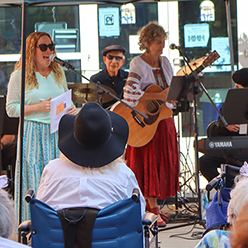
A Ziesen Pesach (a Sweet Passover) at Los Angeles Jewish Health!
Passover is a time for celebration around the world as Jews mark the liberation of their ancestors from Egyptian slavery. This year, across the campuses of LAJH, residents joined together with visitors, family, and staff enjoying delicious food, inspirational music, and the ritual retelling of the biblical Exodus.On the Grancell Village campus, residents of the Joyce Eisenberg-Keefer (JEK) Medical Center and the Mark Taper Building gathered for the campus’ annual seder, generously sponsored by philanthropist Joyce Eisenberg-Keefer. Led by LAJH Chief Mission Officer Rabbi Karen Bender, the seder featured musicians Cindy Paley and David Kaminer, as well as a surprise appearance by “Moses” carrying a baby sheep residents could pet and cuddle.“The reputation of our seder is that it’s special and spectacular, and we’re incredibly grateful to Ms. Eisenberg-Keefer for making it possible every year,” says Ilana Springer, JEK’s CEO and administrator. “It’s so joyful and is a fantastic community-building experience. This year, we hosted at least 200 people!”Additionally, members of JEK’s Drama Club put on a production of the Passover story; residents ran auditions, acted in, and produced the play, which was a huge hit with all in attendance.The Eisenberg Village campus played host to four seders, two for residents of the Newman Building and two more for residents of LAJH’s Fountainview community. On hand to officiate were Rabbi Bender and Rabbi Barry Lutz.“At each event, residents sat together at communal tables decorated with beautiful linens and flower arrangements, and everyone received their own seder plate,” says Annette Weinberg, campus lifestyle and enrichment director for Eisenberg Village. “The seders were truly lovely, and our residents were excited to participate!”Coinciding with the holiday, all Eisenberg Village residents were invited to attend a dynamic Israeli dance performance as well as a traditional Moroccan Jewish celebration of Mimouna (meaning “faith”), a time when families traditionally open their homes to guests and serve an assortment of sweets as they wish each other “success” for the coming year.It was a busy holiday at LAJH—and a wonderful way to usher in a gorgeous spring season! Large crowds atttended Grancell Village's celebration, which included music by Cindy Paley and a visit from "Moses" holding a gentle lamb. Donor (and former board member) Joyce Eisenberg-Keefer and board member Nicholas Thacker were also in attendance, demonstrating their continued support Fountainview residents and guests enjoyed two meaningful Seders led by Rabbi Barry Lutz and Chief Mission Officer, Rabbi Karen Bender, as well as a traditional Moroccan Jewish celebration The Newman Building's Passover Seder offered an interactive experience of the Exodus through readings, songs, and food along with a traditional Israeli dance performance These plates from the Goldenberg-Ziman Special Care Center event showcase the dining staff’s ability to thoughtfully create individualized Seder plates, ensuring the participation and enjoyment of all those at LAJH At the Joyce Eisenberg-Keefer Medical Center, residents showcased a heartfelt Passover performance. They wrote and directed the play themselves, bringing the timeless story of Passover to life with creativity, spirit, and meaning Grancell Village residents took part in the traditional biur chametz, the symbolic burning of leaven, before the Passover Seder Our diligent dietary team, joined by Chief Mission Officer, Rabbi Karen Bender, and overseen by a representative of our Mashgiach, Yehudah Bukspan, engaged in the process of kashering the areas dedicated to culinary endeavors for Passover. This procedure is designed to ensure all aspects of the kitchen are kosher for Passover, employing a thorough cleansing regimen that utilizes boiling water on every surface and utensil, as well as eliminating all leaven such as yeast and baking powder.
May
6
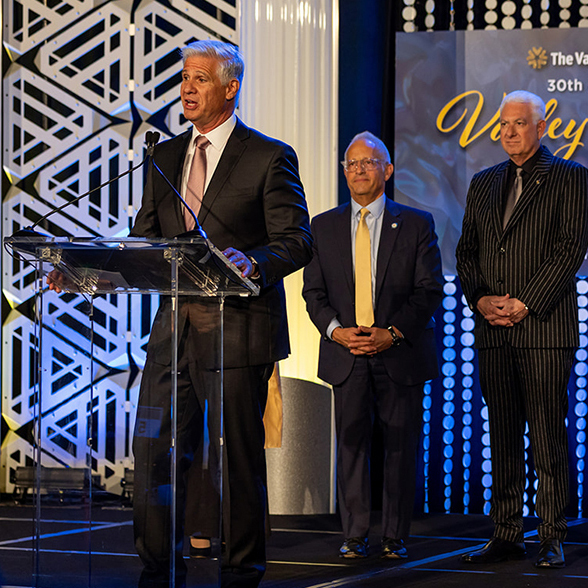
Los Angeles Jewish Health CEO and President Dale Surowitz Receives Humanitarian Award From the Valley Economic Alliance
Last month, Los Angeles Jewish Health (LAJH) CEO and President Dale Surowitz received the Valley Economic Alliance’s prestigious Humanitarian Award. To anyone who knows Dale, the recognition came as no surprise. He took the helm at LAJH just five years ago, but his involvement with the organization—a nonprofit that has been beloved in the Jewish community for more than a century—began decades earlier. In his youth, he visited relatives living at LAJH, then, as he advanced his career as head of prestigious healthcare organizations (including Providence Cedars-Sinai Tarzana), he contributed to LAJH as a leadership volunteer.“Dale works tirelessly to advance the greater good of the community,” says Larissa Stepanians, LAJH’s chief operating officer. “He looks at every opportunity for us to improve the lives of the seniors we serve.”That relentless focus on strengthening senior services has been characteristic of Dale’s tenure at LAJH. Since his arrival, he has continued to blaze a trail to excellence, inspiring everyone from the leadership team to individual staff members to find new ways to help seniors thrive.“I believe we have an ethical and social responsibility to take care of those who don’t have the ability to care for themselves,” Dale says. “At LAJH, we work together to uplift our community’s seniors and treat them with the respect and dignity they deserve.”Dale’s leadership and vision have been instrumental in advancing LAJH’s vital mission. Under his stewardship, LAJH was a national leader in keeping residents safe during COVID, showing it was possible to provide seniors with a secure and nurturing environment even in the midst of a global pandemic.“At LAJH, we have our own on-site practitioners, nurses, therapists, and pharmacists. As a result of our coordinated care and service, we are well-positioned to ensure our seniors stay as healthy as possible, despite whatever challenge comes our way,” Dale says. “I’m incredibly proud of our entire team—under the direction of Chief Medical Officer Dr. Noah Marco and Chief Nursing Officer Tim Carlson—each of whom contributes to our community in their own amazing ways.”Another of Dale’s key strengths is building collaborative relationships with prominent community partners to create an even larger, dynamic network of care capable of meeting the full range of needs for a rapidly growing population of vulnerable seniors.Those partnerships include teaming up with Altamed, the largest provider of healthcare services to the Latino community in East Los Angeles and into Orange County, to establish a satellite campus of LAJH’s renowned Annenberg School of Nursing. The goal is to train more highly skilled nursing professionals and expand LAJH’s ability to have a positive health impact on L.A.’s senior community.“We have a truly outstanding nursing program, ranked among the state’s best for licensed vocational nursing (LVN) programs, and we’re excited to offer our expertise to benefit even greater numbers of seniors,” Dale says.Among Dale’s other ongoing initiatives is growing the footprint of LAJH’s Brandman Centers for Senior Care (BCSC) PACE program, which provides seniors the crucial resources and support they need to remain living safely in their homes while receiving health and social services at vibrant activity centers.“We’ve submitted applications to build new BCSC PACE facilities in Van Nuys, the South Bay, and Palm Springs. This program reaches out into the community and helps coordinate care for seniors by providing them with primary care services, specialty healthcare services, adult day healthcare, transportation, and meals—and it’s all included,” Dale says. “BCSC PACE reduces hospitalizations and enhances quality of life, and in my view is one of the best things going in healthcare today.”Funding these ambitious plans requires ongoing investments from dedicated philanthropists. To meet this need, LAJH will be embarking on a new capital campaign to share LAJH’s story, and the critical need for resources, among key individuals and groups.“We’re going to be engaging donors in efforts to revitalize our campuses, including adding more independent and assisted living,” he says. “The number of seniors in L.A. is predicted to double between 2020 and 2040; people are living longer and outstripping their financial resources. We urgently need more housing and more coordinate care and services, but who will step up to make that happen? At LAJH, we believe it’s our obligation to do so.”Dale’s commitment to giving back is clear evidence of why members of the Los Angeles philanthropy and business communities have honored him for decades. In addition to the Humanitarian Award, he has also been recognized with the Fernando Award (the highest award for volunteerism and philanthropy in the San Fernando Valley), the Community Leadership Award from MAPS Charities and the Heart of Gold Award from the Child Development Institute. He is also a member of Los Angeles Mayor Karen Bass’ Valley Advisory Board.Yet, even when he is earning accolades, Dale deftly switches the subject away from himself and back to his enduring passion: guaranteeing LAJH’s long-term success and sustainability as a provider of essential senior care.“There’s so much for us to do if we are going to meet the rising tide of need, and I believe LAJH is up to the challenge,” he says. “This is a truly special place, where we treat residents as if they are members of our own family and where we remain focused on what matters most: making a positive difference for today’s seniors and for seniors in the future.”
Apr
2
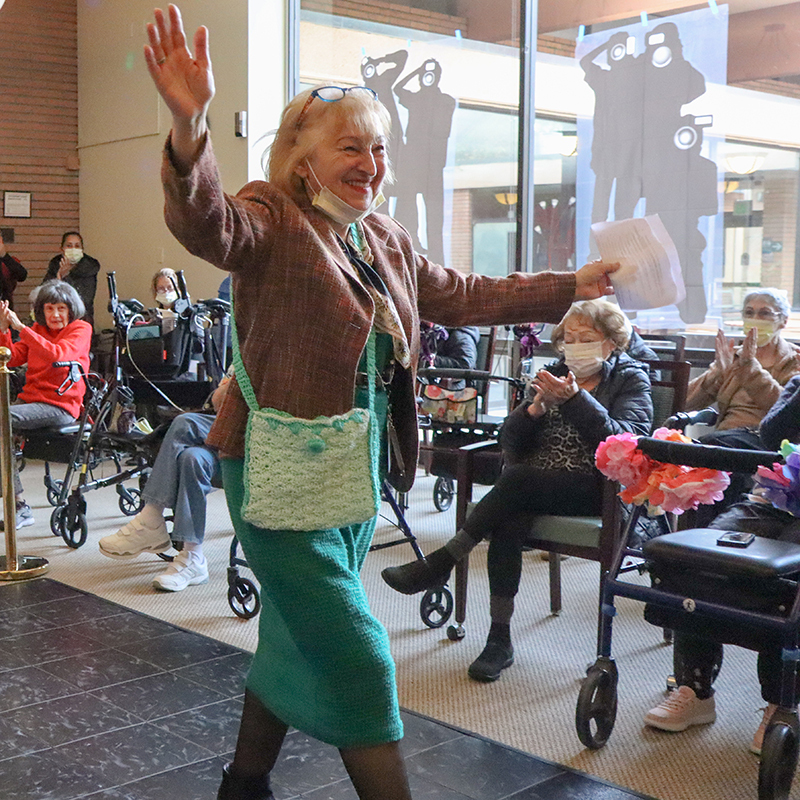
Crafting Community: Radka Falk Nurtures Creative Inspiration at LAJH
At Los Angeles Jewish Health (LAJH), we are enormously proud of the dedicated staff members who help care for our beloved residents. Each person on the team brings their own unique talent and history to the organization, together weaving a beautiful tapestry of care, compassion, and love.Tapestries are right up the alley of Radka Falk, director of LAJH’s popular Arts & Crafts Room, located on the Eisenberg Village campus and a key component of the Lifestyle and Enrichment Department. For nearly 20 years, Radka has been a supportive, engaging, and steadying force at LAJH, helping residents channel their creative energies as they make extraordinary objects of art.Radka FalkA native of Bulgaria, Radka emigrated to the United States in 2000—a single mother of two in search of better economic opportunity.“I worked for a big newspaper and also as a teacher in Bulgaria, but once my son was accepted to university there, I knew that, even with multiple jobs, I wouldn’t have been able to pay his tuition,” she recalls. “It was time for me to make a change.”When she arrived in the U.S., Radka found employment as a private caregiver. In addition to introducing her to her future second husband (a friend of the owners of the caregiving company), the job enabled her to develop critical skills for working with seniors.“One of my clients had Alzheimer’s, and when she was accepted at LAJH, I came and stayed with her for a time,” she says. “The wonderful people I met there offered me a position helping with activities, and that was almost two decades ago. I’ve never looked back.”What many do not know about Radka is that she is an accomplished writer and painter who has authored multiple well-received volumes of poetry. Securing her position at LAJH allowed her to combine her interest in the arts with her newfound abilities in senior care. Under her direction, the Arts & Crafts Room has become a beloved retreat for residents, many of whom visit several times a week. She shares her passion for textile-making and helps others create beautiful handcrafts, from sweaters and skirts to quilts. The participants also work with Radka to explore a wide array of other artistic mediums and to explore their culinary side by cooking delicious baked goods in the onsite kitchen.“I love to knit and to sew, and I also love to help people,” Radka says. “In this job, I get to do both. I am so grateful to have found a home at LAJH.”Both Radka’s colleagues and residents at LAJH say the appreciation is mutual.“It is a pleasure working with Radka,” says Annette Weinberg, campus lifestyle and enrichment director for Eisenberg Village. “There’s something very special about her: She’s such a positive force and a loving person, and her creativity is just amazing. Whether someone needs a hem stitched or we’re seeking blooms to decorate the dining room, she always says ‘yes.’”It’s a sentiment repeated again and again by all who know her.“Radka and I have been close,” says resident Norman Garber. “It’s a pleasure collaborating with her because she’s so talented; there isn’t a thing she can’t do. And she is so compassionate and kind—always with a positive word for everyone.”Radka helps display artwork from resident Norma GarberRadka’s cheerleading offers residents a big boost as they undertake new creative endeavors.“She’s so fantastic at helping me explore my sewing abilities, and she helps me push the limits of what I can learn to do,” says resident Casey Joseph. “I love how understanding Radka is and how she can listen to your ideas, then figure out a way to make them real. It’s such a feel-good environment that I look forward to coming to Arts and Crafts five days a week!”Arlene Bercu, another LAJH resident, is equally glowing in her praise.“I knew at once after touring the Arts and Crafts Room that it would be my happy place,” she says. “Everything Radka does is original and creative, from the beautiful handbags down to the made-from-scratch mandel bread. I actually wore a dress she made me in our recent Purim play. I always tell her she should have owned her own couture shop!”In March, Radka brought the world of high fashion directly to LAJH, working with Annette and the rest of the Lifestyle and Enrichment team to run a fashion show featuring clothes she has made for residents. The clothes were modeled by the residents themselves.Radka at the Newman Building fashion show featuring clothes she has made for residents“We had a runway for our models, and nearly all of the women who spend time in the Arts and Crafts Room participated, including some who actually had careers as fashion models!” she says.Whether coordinating a runway or supervising a cross-stitch, Radka brings her signature creativity, energy, and enthusiasm to every endeavor.“I enjoy doing all this stuff, and it’s exciting because I am able to create something new every day,” she says. “I absolutely love this job.”
Apr
2
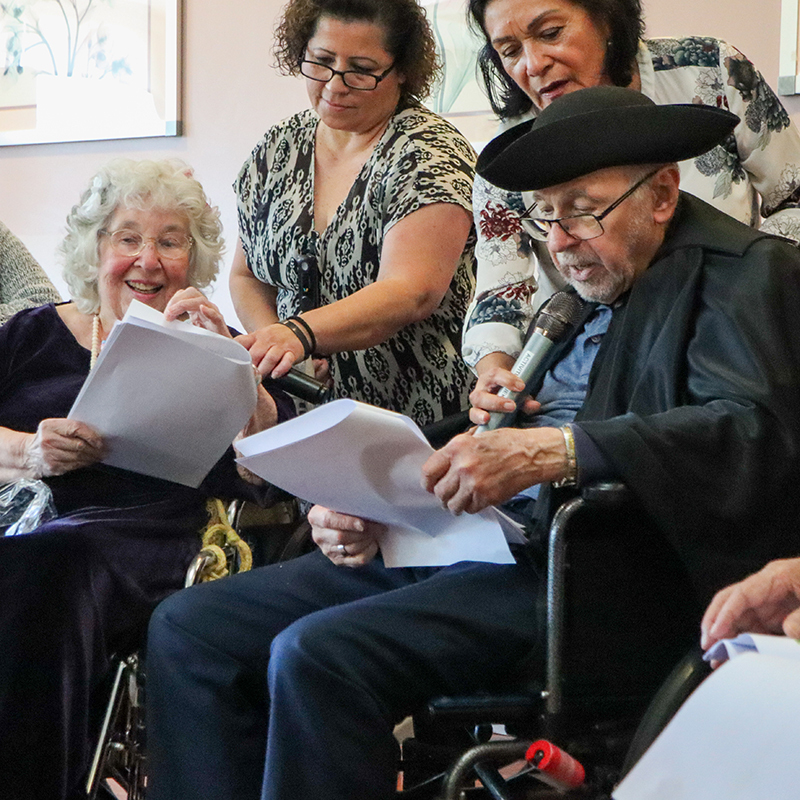
Purim Brings Joy and Laughter to Los Angeles Jewish Health!
The Jewish holiday of Purim is known for many things: delivering baskets filled with goodies to friends and loved ones; providing gifts to the needy; and perhaps most famously, the Purim shpiel—a fun, festive play that retells the story of the Book of Esther. While versions of the shpiel are produced each year on the campuses of Los Angeles Jewish Health (LAJH) and typically performed by staff who volunteer for the roles, this year, the talented residents of the Joyce Eisenberg-Keefer (JEK) Medical center mounted their own Purim production, complete with colorful costumes, songs, and prodigious amounts of laughter.The decades-long tradition of LAJH staff performing the Purim play continued this March at the Taper Building and at Fountainview on the Eisenberg Village campus. The staff dedicated their time for rehearsals and performances, entertaining residents with their comical retelling of Mordechai’s pride, Haman’s evil cunning, and Queen Esther’s bravery. But residents of JEK flipped the script and stretched their acting chops as they brilliantly infused their own creative ideas and energy into the holiday skit—making it the most special one yet.The cast of the 2025 Joyce Eisenberg-Keefer Medical Center Resident Purim Shpiel“Traditionally, we as staff would do the entertaining during Purim, but the residents were excited to play a role, so they ‘fired’ us in the most beautiful way,” says Ilana Springer, JEK’s CEO and administrator. “We were thrilled to witness this turn of events because it meant our residents were feeling empowered to run programs and to lead their lives proactively and intentionally. It’s wonderful to see them taking so much initiative.”Orchestrating the event was JEK’s Director of Therapeutic Activities Susan Leitch, who helped organize rehearsals, run technical aspects of the production (such as sound), and provide other key support.“What was so amazing about this year’s shpiel is that the whole thing was resident-driven,” she says. “From choosing the script, to adding songs and dialogue, to casting, they were the ones calling the shots!”Resident Barbara Fallick delighted in the opportunity to dip her toe in the world of theater. “It’s so much fun being dramatic!” she says. “We can be childlike in our portrayals of the villain Haman, as beautiful as Esther, and as dignified as Mordechai.”Fellow cast member Steven Horowitz also loved participating.“Coming up with a play that was original to the story, but a different adaptation in a humorous way—it was really fun,” he says. “All of our rehearsals made a big difference, and it was an awesome experience.”The Purim shpiel was just one in a series of LAJH events related to the holiday. Other celebrations on the Grancell Village campus included a Purim concert by well-known singer-songwriter Cindy Paley (who also performed at Eisenberg Village) and a traditional reading of the megillah (the Scroll of Esther) by Orthodox Rabbi Hershey Spitzer. At Eisenberg Village, in addition to the Purim shpiels, there was also a resident-led megillah reading and an Arabian-themed buffet dinner complete with professional belly dancers.“The energy here at LAJH during Purim was truly infectious across the board,” Ilana says. “Everybody came together as part of a warm and cohesive community.”Fountainview at Eisenberg Village residents and staff PurimLAJH staff put on a shpiel at the Mark Taper BuildingEisenberg Village staff perform a shpiel for residents of the Newman BuildingNature Gan Preschool visit to the Joyce Eisenberg-Keefer Medical Center for PurimLeo Baeck Synagogue 7th grade visit to the Newman BuildingResidents of the Joyce Eisenberg-Keefer Medical Center welcomed a visit from 4th-grade girls from Yeshiva Ketana of Los Angeles.Residents from both the Newman Building and Fountainview at Eisenberg Village read chapters of the Megillah for Purim in the Eisenberg Synagogue. Chief Mission Officer Rabbi Karen Bender visits residents for Purim, bringing joy and silly disguises
Mar
5
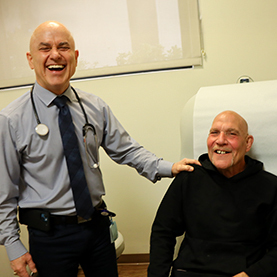
A Day in the Life of Brandman Centers for Senior Care PACE
Working to Enhance Seniors’ Quality of Life There are so many ways Brandman Centers for Senior Care (BCSC) PACE helps make a difference in the lives of participants. Its comprehensive services spanning head-to-toe medical assistance, engaging social activities, rehabilitation, transportation, social services, delicious meals, and even home care services enable participants to stay healthier, active, and engaged—making BCSC PACE so much more than just an adult day healthcare center.“As people live longer and the number of older adults in our community grows, there is an increasing demand for programs like BCSC PACE, which offers seniors critical services that empower them to continue to reside in their own homes for as long as possible,” says Vice President of BCSC PACE, Kim Stratman. “Seniors and their loved ones trust us to support their daily needs, and we are honored to fulfill that commitment every day.”People from all backgrounds and walks of life look to BCSC PACE as a vital source of care and comfort as they seek to enhance their wellbeing. They turn to the program for the stability and support it provides—uplifting them with essential assistance in improving their diets; strengthening their bodies; sharpening their minds; managing anxiety and depression; learning to navigate illness; making new friends; and even coping with grief and loss.Steven Glick is a prime example of how seniors benefit from BCSC PACE’s incredible array of services. He depends on expert, compassionate care from the entire BCSC PACE team at the Reseda location as he continues to recover from a life-threatening bike accident that left him with a broken neck and shoulder.“I was at UCLA West Valley Medical Center for the first three months following the accident, then in a nursing home for a year before ending up at Providence Cedars-Sinai Tarzana Medical Center,” Steven recalls. “It was there that I met Dr. [Casey] Ott, medical director of BCSC PACE, who recommended I come to Los Angeles Jewish Health’s (LAJH) Grancell Village Campus for rehabilitation. That was last July, and thanks to the progress I’ve made, I haven’t had to be readmitted to the hospital since!”Steven GlickHe now rents a room in a shared house in Sun Valley and visits BCSC PACE three times a week for exceptional medical care, delicious nutritious meals prepared by the outstanding dietary team, stimulating games and activities and wonderful camaraderie and socialization with fellow seniors. The center also arranges his transportation and identifies any medical specialist he needs.“I’ve had so much injury in my body, and the folks at BCSC PACE have really listened to me and taken an active role in my recovery. The doctors and nurses who treat me there are world-class, and when my care requires specific expertise, they partner with outside specialists. During my time here, I’ve seen nerve and spine specialists, a cardiologist, physical and occupational therapists, an acupuncturist, a massage therapist, you name it. Whether it’s the medical staff, the person who drives the shuttles, or the cook who makes you meals, everyone is so full of love,” he says. “I never thought I’d get my quality of life back after my accident, but that’s what Brandman has given me. I’m forever in their debt!”Participants like Steven are especially thankful for the fantastic activities that get their bodies moving and their spirits soaring. From puzzles, trivia games, and bingo, to stretching, music therapy, special entertainers, holiday celebrations, and beyond. BCSC PACE is a one-stop-shop for seniors eager to reap the physical and mental health benefits of robust social engagement.BCSC PACE currently serves nearly 450 area seniors on its two campuses in Reseda and West L.A. Among those who visit the centers are: Fabiola Anleu, who enjoys coming for craft activities and credits BCSC PACE with “saving her life”; Linthong Phannaporn, who lights up when she visits, spreading joy as she shares her passion for knitting and crocheting with fellow program participants; and Alberto Masnicoff and his wife, who appreciate the physical and emotional nurturing they receive from BCSC PACE staff.Across the program, among participants, families, and other loved ones, there is a deep sense of community for all who are involved with BCSC PACE. Perhaps Steven sums it up best: “Whenever I talk to my brothers, who have closely followed my health struggles, they always say, ‘Thank God for Brandman!’”
Mar
5
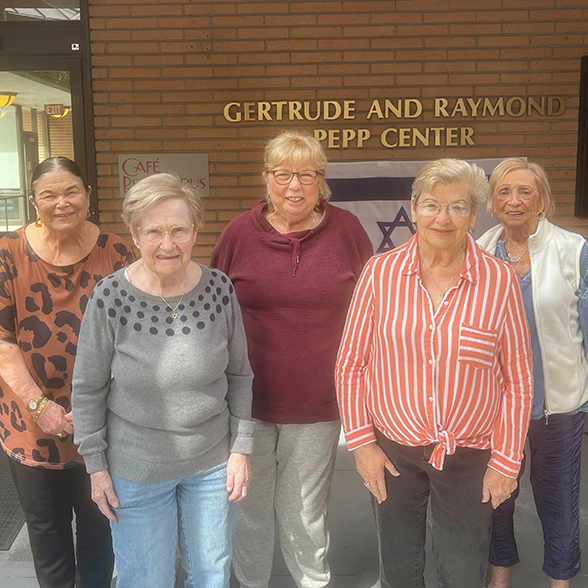
Los Angeles Jewish Health: Where Resident Councils Ensure Everyone Has a Voice
Supporting the right to freedom of speech has always been a central tenet of American culture. At Los Angeles Jewish Health, we take this right to heart, ensuring every one of our residents, participants, and members has a voice and is heard. One of the most impactful ways this occurs is through an active resident council process on each of our campuses.Resident councils at LAJH are elected bodies that are very much independent and led by the residents themselves. Council leaders engage other residents to participate in discussion and even debate around issues that have impact on their day-to-day campus experiences. Although the structure of the councils varies depending upon the campus facility (some have co-presidents, others have multiple vice presidents, and still others have positions such as parliamentarian), each is based on the same deep-seated commitment to representation. Residents are chosen by their peers to represent their interests and to partner closely with LAJH leadership to achieve the best and most fair outcomes for everyone. The councils are a tangible example of the teamwork that goes into care for all at LAJH.“Through a democratic process, the councils give residents a say in ways that make them feel invested in the governance of their communities,” says Annette Weinberg, LAJH’s campus lifestyle and enrichment director for Eisenberg Village and liaison to resident councils in the Newman Building and Fountainview. “They’re absolutely vital to resident life.”During meetings held each month, residents hear updates from council officials and from LAJH leadership on issues that range from selection of furniture for the common areas of campus to transportation logistics to ideas of what should be offered on ever-changing menu selections.“Our town halls are a wonderful opportunity for residents to get involved with whatever might be happening at the time,” says Marcia Mass, president of the resident council at the Newman Building. “Recently, we offered input on some planned upgrades here at Newman that included new carpeting, new lighting, and fresh paint. It’s so exciting to see how our opinions can make a difference!”Newman Building Resident CouncilFor Sue Richter, co-president of the resident council at Fountainview, running for a seat was a natural extension of the volunteer leadership work she has carried out throughout her life. “I was president of my temple sisterhood; I’m that type of person,” she says. “Moving to Fountainview is the best thing I ever did, and being on the council allows me to give back. It’s a fantastic way to keep residents up to date and let the administration know how we feel on a particular topic.”Co-president Bill Green also has a history of working with Jewish organizations as a lay leader, prior to arriving at Fountainview two and a half years ago. Through his role on the council, he has gained crucial insight into how LAJH works and ways he can help his fellow residents share their creative ideas.Fountainview at Eisenberg Village Resident Council“When Sue and I started our terms, we found we could bring up any topic we wanted,” he recalls. “For instance, we recommended there be a full-time registered nurse at Fountainview during the week. Working through the council, we collaborated with the administration; they agreed and made it happen. I’ve found that LAJH administration is very receptive to dialogue. It’s terrific because our residents are realizing that, if there’s a change or improvement they’d like to see, they can have influence through the resident council.”Susan Leitch, director of therapeutic activities at the Joyce Eisenberg Keefer (JEK) Medical Center, helps facilitate JEK’s resident council. She says the council there is truly invaluable.“During each meeting, residents sit down with our administrator/CEO, chief mission officer, director of nursing, our infection preventionist, our director of social services, our maintenance and housekeeping leads, the heads of our dietary and laundry departments, and me. We gather to hear residents’ accolades, comments, or concerns,” she says. “There’s so much benefit to having the council: Residents are empowered knowing they can effect change in their own home.”The JEK council’s officeholders, Linda Zweig (president), Lois Schindel (vice president), and Barbara Fallick (secretary), echo Susan’s enthusiasm.Joyce Eisenberg-Keefer Medical Center Resident Council“I’m always thrilled to see how many people are in the room at our meetings each month,” Linda says. “To me, it’s an indication of how much the residents care about building their community.”Lois is grateful the council can serve as a practical tool for residents seeking support. “It’s a great forum for people to interact and identify whom to contact about an issue that they’d like to see addressed,” she says.Every meeting begins with a reading of the minutes from the previous month’s gathering. “I love doing that because when we review what we talked about last time and then move onto current business, we can reflect on how much has been accomplished,” Barbara says. “Seeing that progress is very affirming—it shows all of us residents that we matter!”Elaine Mark, president of the resident council in the Taper Building, notes that there are other upsides to the councils, as well. Now in her third term on the board, Elaine has seen first-hand how resident participation translates to a more cohesive community.“Because of the councils, we’ve all gotten to know each other better, and that’s ended up leading to greater participation in our activities, which is wonderful,” she says. “It’s also opened up lines of communication with our administrators. They are eager to partner with us, and their support makes LAJH a very easy place to live.”Elaine Marks, President of the Mark Taper Building Resident Council
Feb
5

Care and Comfort:
Keeping the Seniors of LAJ Health Safe and Secure Throughout Historic Los Angeles Wildfires
As 2025 began and families returned from holiday celebrations, no one could have imagined the devastation, anguish, and heartache the people of Los Angeles and the surrounding areas were about to experience.Fortunately, Los Angeles Jewish Health (LAJH) remained out of harm’s way. At LAJH, the safety and security of those in our care is paramount. We prepare each year for any disaster or crisis that could affect our campuses. Efforts include online courses and real-time, in-person drills.On January 7, as media shared images of the Pasadena Jewish Temple Center being directly impacted, it became clear this rapidly growing disaster would affect our community, including through a potential surge of seniors dislocated from other sites with nowhere else to go. That night, Senior Vice President of In-Residence Services Ilana Springer, CEO and President of LAJH Dale Surowitz, and a handful of leaders quickly jumped on the first of many daily calls, reviewing all emergency plans to ensure the safety of our residents, participants, and staff.(Left) LAJH volunteer Steven Zonis and Certified Therapy Dog Rudy joined by LAPD Chief of Police Jim McDonnell and staff (Right) Zonis and Rudy outside of the Sheriff’s Mobile Emergency Unit Among their first actions was confirming we had a good inventory of emergency supplies, including non-perishable food and water, surgical masks, and generators. Facility staff also positioned additional air filtration systems and confirmed emergency lighting was operational. Perhaps most important was assessing the welfare of our staff. Many LAJH staff live within the impacted area, and we wanted to make sure they were safe. Next, we needed to confirm we would have adequate staffing to continue providing our excellent care without disruption. The cross-functional teamwork from across LAJH that stepped up to ensure coverage was impressive: We made sure staff were standing by for deployment wherever help was needed.We communicated quickly and clearly to our internal and external audiences, updating them on our emergency efforts via email, voicemail, social media, and the website. We also reached out to fellow senior care centers and community leaders offering our support.Those displaced who came to us for shelter included a couple evacuated from their apartment in Palos Verdes, another woman from Palos Verdes whose home burned down, and a woman evacuated from her home in Encino.Our volunteers and even our cherished residents played a part in providing comfort. The wonderful canine companions and handlers who visit our campuses, thanks to funding from the Steven Ohren Foundation, reported to emergency command centers. They provided mental health support to those impacted by the disaster, including emergency workers as well as victims.In addition, our seniors teamed up with local schoolchildren to create thank-you signs for the heroic firefighters who worked around the clock under extreme and dangerous circumstances.While our campuses fortunately remained unthreatened throughout, the air quality prevented outdoor activities. One afternoon during this period, Chief Mission Officer Rabbi Karen Bender was finishing a lesson on the fourth floor of the Joyce Eisenberg-Keefer Medical Center when she noticed that, one-by-one; participants were turning to look out the window. They were seeing smoke from the Kenneth fire that had started that afternoon. The flames were miles away, but it was clear from the residents’ faces that this development was creating growing concern and fear. As Rabbi Bender and Ilana began strategizing about the best way to address the issue, Andrew, an activity aide at JEK, decided—without prompting—the best thing he could do to help was simply to sit down at the piano and start playing. This immediately diverted the seniors’ attention, and suddenly, everyone looked comforted and cared for. It was a signature LAJH moment, highlighting the warmth, dedication, and collaboration of our team and of the entire LAJH family.From ensuring we had evacuation plans and transfer agreements (including agreements with other facilities) in place, to continuously monitoring our emergency supplies, we remained vigilant throughout this disaster and confirmed that LAJH was indeed well prepared. The LAJH family can rest easy knowing we are ready for whatever may come our way.Of course, you can never be too prepared, and before a disaster is the best time to stock up on blankets, wheelchairs, non-perishable food, air purifiers, bottled water, etc. If you would like to contribute to help us purchase additional emergency supplies for the safety of the seniors in our care and for our devoted staff, please click here. LAJH Certified Therapy Dog Rudy visits the Fire Command Center Students from Milken Community School join residents of the Newman Building, making signs of gratitude for firefighters
Feb
5
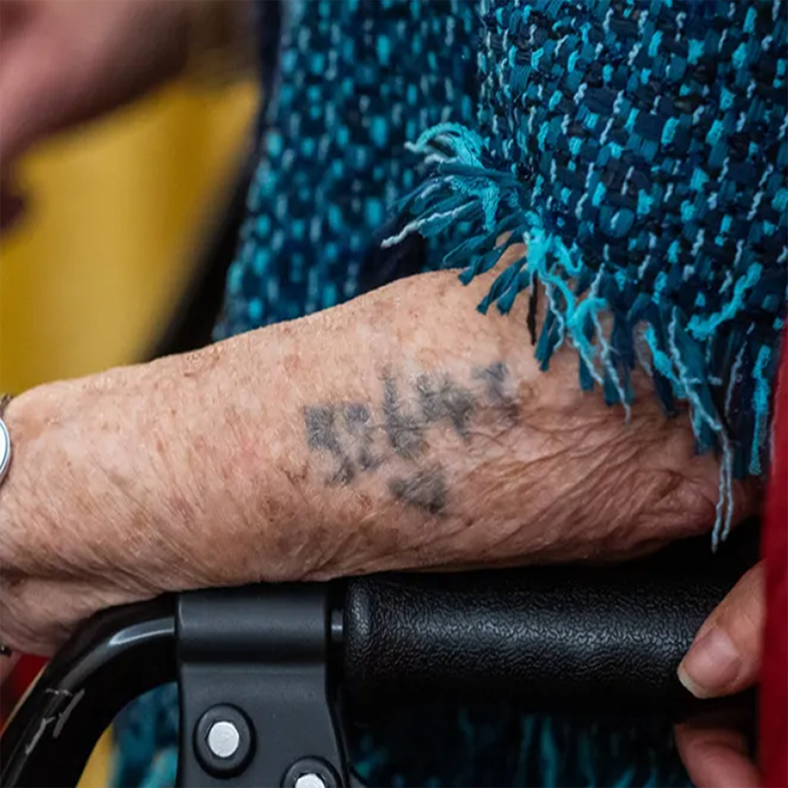
Caring for the Ages at Los Angeles Jewish Health
January 27th commemorated the 80th anniversary of the liberation of Auschwitz—the most notorious of Nazi concentration and extermination camps. Every day, there are fewer living witnesses to the atrocities and tragedies of that era. Today, only approximately 245,000 Holocaust survivors remain. Many of these cherished seniors are frail and have multiple medical needs requiring care from expert geriatric healthcare providers like the care teams at Los Angeles Jewish Health (LAJH).At one time, there were 113 Holocaust survivors in residence at LAJH. Now in their 90s, 29 still call LAJH home, including a new 95-year-old resident and survivor who came to live at LAJH just last week. What they find here, thanks to the incredible professionalism of a highly-trained staff who wear compassion on their sleeves, is a special combination of nurturing, expertise and an ethos—developed by Chief Medical Officer Noah Marco, MD, the child of survivors—that prioritizes listening.Sally and Ben Marco, Holocaust Survivors and Parents of Dr. Noah MarcoHis approach has made Dr. Marco a trusted source of education on senior care and specifically on caring for Holocaust survivors. Last month, he presented to 15 medical students from the University of California Los Angeles who came together to learn about the Holocaust and about the importance of providing services, in a caring and sensitive manner, to each member of the survivor community.“There are many things to keep in mind when caring for Holocaust survivors. For instance, it’s important not to rush the patients, as well as to approach and touch them only after getting explicit permission,” Dr. Marco said during his presentation. “Best practices also include recognizing potential signs of post-traumatic stress disorder (PTSD); asking the patients about common somatic symptoms; and realizing that sexual or abuse questions are unlikely to get a truthful response. Survivors’ history makes them unique, and as care providers, we need to adjust our approach accordingly.”Participants in the class reported dramatically expanding their knowledge of the subject. “Despite attending a public school in Los Angeles, the second most Jewish city in the U.S., I learned about the Holocaust for a maximum of five minutes,” noted one student. “My time with Dr. Marco helped fill the void from those high school history classes; he spoke wonderfully, and I learned a lot.”Whether he is imparting wisdom about caring for survivors or speaking more broadly about the many distinct facets of senior health, Dr. Marco enthusiastically shares strategies to help make medical visits more efficient and satisfying, both for the care provider and for the patient.“Treating our patients at LAJH is not only about cataloging their symptoms, many of which are chronic and may not resolve. It’s also critical that we truly see them: learning what matters most to them, asking them what questions they may have, and eliciting their ideas and expectations,” Dr. Marco says.Dr. Marco, who is often called upon to share his expertise in geriatric health, recently laid out his philosophy related to providing medical care to seniors in an essay he authored for the publication Caring for the Ages, the official newspaper of the Post-Acute and Long-Term Care Medical Association (PALTmed). He was recognized with a second-place award in the paper’s 2025 essay competition, “Caring for Residents, Caring for Ourselves.” The essay will appear in Caring for the Ages’ March/April 2025 issue, which will be distributed to a wide national audience of post-acute and long-term care professionals. His other recent publications include “The Lost Summer” an essay published in this week’s edition of McKnight’s Long-Term Care News.“My goal in treating seniors is always to move beyond just discussing their chronic issues so that we’re able to elicit their input about things that are important to them,” he says. “When they feel heard, they often feel better—one of the key indicators, for a care provider, of a job well done.”Dr. Noah Marco, Chief Medical Officer at LAJH
Jan
8
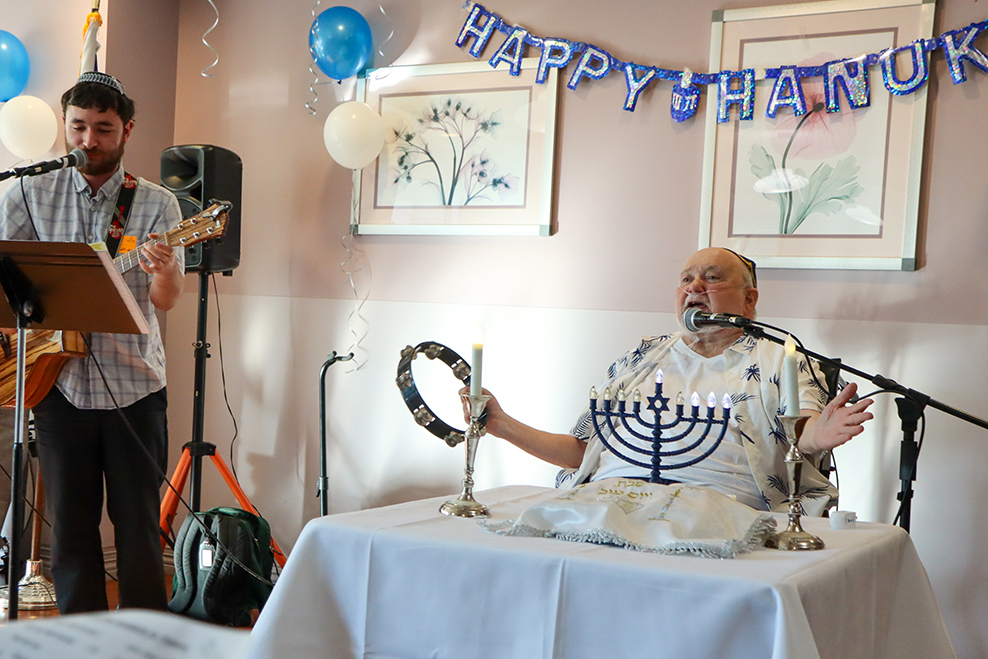
Be The Shamash: The Light That Illuminates the Other Lights:
Chanukah 2024 at Los Angeles Jewish Healthby LAJH Chief Mission Officer Rabbi Karen BenderWhy it was important, this year especially, to bring in the Light Chanukah’s arrival this year inspired me to consider that there are three kinds of people in the world. The first are those who unfortunately bring darkness to our world. The second are those who bring light where there is darkness. Those people are wonderful, because where there is despair they bring hope, where there is sadness they bring joy, where there is cruelty they bring loving kindness, where there is tension, they bring peace. Then there is the third kind of person, the one who, like the shamash candle of the Chanukah menorah, in addition to conquering darkness, actually kindle the other lights. These are the staff members and residents at Los Angeles Jewish Health. Not only do they bring light, they inspire others to bring the light. What made the events this year at LAJH Extraordinary As holidays approach, it is always our goal to ensure residents experience something akin to what they would have had in their homes and at synagogue. This year, we are proud to have gone beyond that goal to bring joy, celebration, surprise and delight! Residents enjoyed not only potato latkes but also creative vegetable latkes. They enjoyed traditional sufganiyot and kosher Krispy Kreme donuts. At Grancell Village, they experienced a sufganiyah tasting, including creme brulee and dulce de leche. There were concerts performed at each campus with the renowned Cindy Paley and elaborate outdoor extravaganza lightings with our enormous and artistic outdoor Chanukiot. Twelve year old twin volunteers dressed up as a life sized menorah and dreidel and visited each floor bringing smiles and laughter. Shabbat Chanukah services were led by a skilled nursing resident Rabbi and a band he assembled! Resident volunteers took charge of lighting the menorah lights on their floors each night. At the Joyce Eisenberg-Keefer Medical Center, those same twin volunteers assisted me in re-affixing mezuzahs on every room, as residents participated. Rabbi Ron Goldberg held a food and toy drive at Eisenberg Village, enabling the entire campus to participate in seasonal giving to those in need. In the midst of it all, our wonderful activities staff ensured that residents celebrated New Year’s 2025, perhaps a once in a lifetime overlap with Chanukah. We are so grateful to all who worked together bringing so much joy and celebration to the residents of LAJH! Chanukah celebration led by resident Rabbi WarshawYoung volunteers delight residentsEisenberg Village toy driveConcert with Cindy PaleyResident sufganiyot tastingGoldenberg-Ziman Special Care Center residents celebrate with glowsticksMezuzahs re-affixed in the Joyce Eisenberg-Keefer Medical CenterToast to the New YearBrandman Centers for Senior Care PACE celebrates the New Year